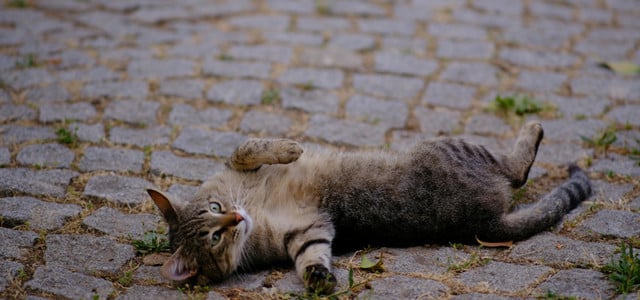
If you come across a stray cat on holiday, you should keep your distance. As a rule, petting the cat will not help the animal or yourself. What can you do instead?
Even on the most wonderful vacation, cat lovers often think of home. Because one thing is usually missing when traveling: the beloved furry friend that had to stay at home. How nice it is when you meet a free-roaming cat at your vacation spot that you can pet – right?
Distance from stray cat
Especially in southern countries, stray cats are a common sight on the streets. But as much as it may be tempting for animal lovers, caution is advised. Even if it is difficult, it is safer to keep your distance. And you should pay attention to the animal’s body language, recommends animal welfare expert and veterinarian Theresa Müschner-Siemens from the World Animal Protection Society, because stray animals are often not used to dealing with people.
Even if the cat appears trusting, petting and feeding the animal will not help it in the long term. After all, once the holidaymakers have left, the animal will suffer even more, says Müschner-Siemens. You can usually achieve more by donating food, time or money to a local animal welfare organization.
How do you help a sick animal?
If the cat is obviously in need of help, sick or acting strangely, the World Animal Protection Society advises contacting a local animal welfare organization or veterinarian. And of course: keep your distance – there may be a risk of infection.
Petting a stray cat: What are the risks?
A brief caress could then also have consequences for humans. Stray animals often harbor bacteria, viruses, fungi or parasites. Diseases such as scabies, giardia, fungal skin diseases or worms can be transmitted through skin contact, says Müschner-Siemens.
The animals can also have an ectoparasite, such as ticks or mites, or fleas, which “can be passed on to humans when they are stroked,” says Dr. Camilla Rothe, senior physician at the Institute for Infectious and Tropical Medicine at the LMU Hospital in Munich. Rabies, a deadly viral infection, also exists in many countries around the world.
After contact: wash hands
If you have come into contact with an animal, you should wash and disinfect your hands afterwards. But it is not just petting that poses a risk, because the animals can also scratch or bite, and bite and scratch wounds can become infected, warns Rothe. In this case, wash the wound with soap and water for 15 minutes and disinfect it. If there are signs of inflammation such as redness and overheating and in areas where rabies is endemic, you should seek medical help immediately, says Rothe.
Read more on Techzle\.com:
- Cooling down cats: How to help your pet in the heat
- Get rid of cats: With these gentle methods, your garden will be cat-free
- Cat in bed: Why it also has health benefits
** marked with ** or orange underlined Links to sources are sometimes affiliate links: If you buy here, you are actively supporting Techzle\.com, because we then receive a small part of the sales proceeds. More information.